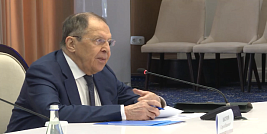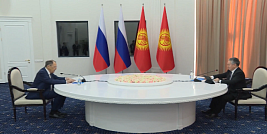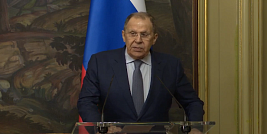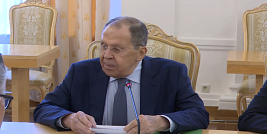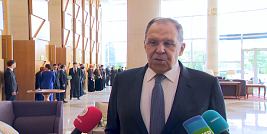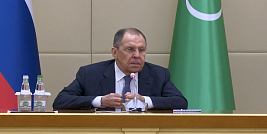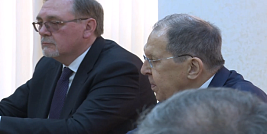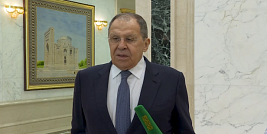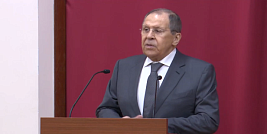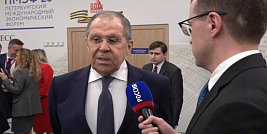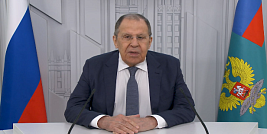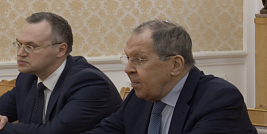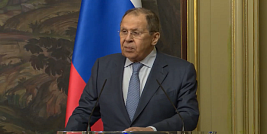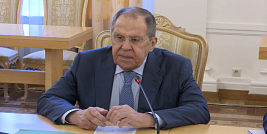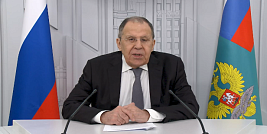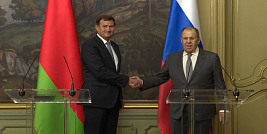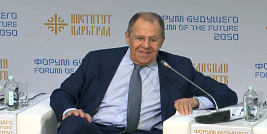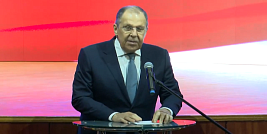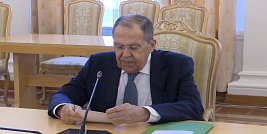Foreign Minister Sergey Lavrov’s statement and answers to media questions at a joint news conference following talks with Syrian Minister of Foreign Affairs and Expatriates Faisal Mekdad, Moscow, February 21, 2022
Ladies and gentlemen,
During our talks, we focused on the steps to achieve a comprehensive settlement in Syria based on the solid ground of UN Security Council Resolution 2254. We proceed from the premise that it is necessary to build a constructive intra-Syrian dialogue, primarily within the Constitutional Committee. This must be done consistently, without distraction from small details. It is important to focus on the priority – a direct conversation between the Syrian delegations, encouraging them to reach agreement on constitutional reform, without external interference or contrived timeframes.
It is important that the Constitutional Committee operate consistently, without artificial interruptions. The committee must convene on a regular basis, along with the drafting commission. Frequent rescheduling (which has been happening recently) in attempts to perfect the methodology of these sessions is clearly not helping us move forward. This will be our position when, in a couple of days, UN Special Envoy for Syria Geir O. Pedersen visits Moscow.
We noted the significance of the Astana format – a mechanism in which Russia, Iran and Turkey developed a support process for intra-Syrian talks and are using it to stimulate the dialogue. In December 2021, the 17th Astana format meeting took place at the special representative level in Nur-Sultan. I hope that next month we will be able to hold important events involving this troika.
We discussed the grave humanitarian situation in Syria. We agree that, at this point, international assistance to Damascus for the purposes of post-conflict recovery, including, in addition to humanitarian response, the implementation of projects for the speedy reconstruction of socioeconomic infrastructure, as required by the unanimously adopted UN Security Council Resolution 2585, is of utmost importance.
We have strongly condemned the illegal unilateral Western sanctions on Syria which bring even more suffering to the Syrian people. These restrictions, especially amid the pandemic, are unnatural. We reaffirmed our commitment to continue our efforts, and those of our like-minded partners, to mobilise the assistance of the international community for the return of Syrian refugees to their homes. We see how this process is being artificially hampered by Western countries.
We discussed our joint plans for bilateral cooperation and expressed serious concern about the terrorist threat emanating from the country’s regions that are not controlled by the government. A brazen attack by ISIS militants on a prison in the town of Al-Hasakah in January came as a graphic illustration of the deteriorating security situation in the Trans-Euphrates area.
In order for the Syrian state to be able to more effectively repel the terrorist threat, it is important not only to help build up the capacity of the Syrian forces, but also to stop what we see regularly, namely, ongoing Israeli strikes against targets in Syria. We condemn these actions which violate UN Security Council resolutions and can also provoke a sudden escalation of the situation throughout the region.
We touched upon Syria’s return to the family of Arab states and noted that this process is gaining traction. I hope that Damascus' active efforts to normalise relations with its Arab neighbours will create proper conditions for resuming, in the near future, Syria's full-fledged participation in the League of Arab States.
We covered other pressing items on the regional and global agendas. I shared with my Syrian colleague our assessments of current developments in the international arena. Our counterparts assured us that Damascus fully supports Russia's consistent policy of protecting its legitimate interests in the context of consolidating the role of international law in international affairs. We are united in upholding the need to respect the UN Charter’s purposes and principles, non-interference in the internal affairs of the states, and ensuring the sovereign equality of states. This implies unwavering respect for the fundamental principle of equal and indivisible security which says that that no one anywhere on our planet should enhance their own security at the expense of the security of others.
We talked in detail about bilateral cooperation in the economy, culture, and education, military and defence industry interaction, and people-to-people contacts. We reaffirmed both countries’ commitment to expand this cooperation further, including through the energetic efforts of the Intergovernmental Commission for Cooperation in Trade, the Economy, Science and Technology.
Question (to both ministers): Today you talked about the condemnation of Israel’s aggressive actions related to its attack on Syria. Actions like these help terrorists, given the ongoing occupation of our territory by the Americans, Turks and Israelis. What tools can be used to stop Israel?
Sergey Lavrov: We have a consistent position on this issue and believe the attacks on Syria that Israel keeps carrying out not only violate [the relevant] UN Security Council Resolution but also undermine Syria’s ability to stand up to terrorism threats, not to mention the risk of Syria being turned into an arena of confrontation between other countries. This is unacceptable. We are interested in seeing that Security Council resolutions are complied with and all parties abstain from any steps that could further inflame the situation across the region. We are maintaining close contact with our Israeli colleagues, at both the top level and the level of the foreign ministries.
As for the [foreign] countries in Syria that are present there in defiance of the will of the Syrian leadership and without approval by the UN Security Council, this topic is invariably in the focus of our attention when we discuss the settlement process in Syria with our foreign interlocutors. We insistently call on them to strictly observe UN Security Resolution 2254, which explicitly affirms the Syrian Arab Republic’s sovereignty, territorial integrity and political independence. We are guided by this in our relations with both external players and Syrians who are in opposition to Damascus, including various bodies established by the Kurds. We will continue to do this work.
Question: What can you say about Vladimir Zelensky’s recent remarks to the effect that Washington is not sharing intelligence about Ukraine with a number of Western politicians? When and where is it possible for you to meet with the US Secretary of State and the French Foreign Minister? What does Moscow make of France's initiative to convene a summit between Vladimir Putin and Joe Biden and then invite non-stakeholder countries to discuss security and strategic stability in Europe?
Sergey Lavrov: With regard to the intelligence information that the United States possesses, there is a story behind this phenomenon. There were instances where the intelligence information obtained by the corresponding US services was not shared even with the Secretary of State. I am referring to Colin Powell who was made a target of jokes in 2003 when he was handed a vial with an obscure white powder, and said, at the UN Security Council, for the whole world to hear, that it was anthrax. This vial was used to justify the aggression against Iraq, the consequences of which are still felt by the Iraqi people, with the exception of the hundreds of thousands of Iraqis killed by NATO.
Examples abound of the specific nature of the intelligence information in the United States and include attempts to create out of whole cloth the problem of chemical weapons which allegedly persists in Syria because an incident was staged in the Syrian town of Douma (which fact has been proven many times, including by witnesses). This is a well-known development when the White Helmets – provocateurs financed by the British and the Americans – staged an incident. Together with its Western colleagues, the United States is still trying to use this lie to adopt some resolutions at the OPCW.
Today, we discussed our consistent policy of exposing these provocations and defending the sanctity of the Chemical Weapons Convention. There are many other examples of the intelligence of our US and UK colleagues being used to manufacture provocations. It turns out later that this information either does not exist, or they are unwilling to share it. That is how things were with the Salisbury incident, the Navalny “poisoning” and the explosions in the Czech Republic 8 years ago, which everyone quickly forgot about, because the charges were clearly untenable. Yesterday (the most recent development), the US government in Moscow issued a warning about impending terrorist attacks in crowded places in Moscow and St Petersburg, such as railway stations, metro, or shopping centres. So far, no confirmation has been received or discovered. The embassy said something vague about “having read in Russian newspapers and media that they were possible.” I think everyone should see for themselves to what extent this kind of work is serious and whether the state institutions, I mean embassies and “structures” in Washington, should engage in such dealings.
With regard to possible meetings with my colleagues from the United States and France, the possibility is now being considered by our respective foreign ministries.
As for President Emmanuel Macron’s initiatives to hold a summit between President Putin and President Biden followed by a summit of either the P5 with the invitation of other states, or a separate group of states on international and European security issues, indeed, President Macron mentioned this during two conversations with President Vladimir Putin yesterday. However, the President of Russia has made it clear on several occasions that we are not against holding summits or meetings, but before such a meeting, especially in a tense atmosphere like today, it is important to know what these summits and meetings will end in and what will be their result. The leaders of Russia and France agreed that our Western colleagues, who initiate such events, will share their vision of the possible outcomes with us. We are waiting.
Question (via interpreter): What do you think of the United States’ actions in Syria?
Sergey Lavrov: We have already given our assessment of the United States’ actions in Syria. It is well known what the Americans are doing there: they have occupied the east bank of the Euphrates River and are denying the legitimate Syrian authorities access to hydrocarbon resources and grain, that is to say food. This is unacceptable. The wooing of certain Kurdish entities – something we observe now and then in American policy, which openly aims to incite separatist sentiment – is a very dangerous idea and game. In talks with the United States on the settlement process in Syria through military-to-military and diplomatic channels we are always highlighting these issues. We have reason to believe that it is not in one ear and out the other with the Americans, although we are not seeing any tangible results on the ground.
Nonetheless, the United States has recently started to have a more realistic perspective on what is happening is Syria and on how it needs to proceed with respect to a Syria settlement. At least, we no longer hear any of the unjustifiably confident statements made in 2011 and 2012 to the effect that the days of the regime are numbered. Not only the United States but an increasing number of countries in the region, Arab countries, Syria’s neighbours and the Arab League member countries are realising that they need to work with the legitimate representatives and the legitimate authorities of the Syrian Arab Republic. We welcome this trend. The sooner it takes the form of practical agreements and the search for practical solutions, the better for the Syrian people and the peoples of the entire region.
